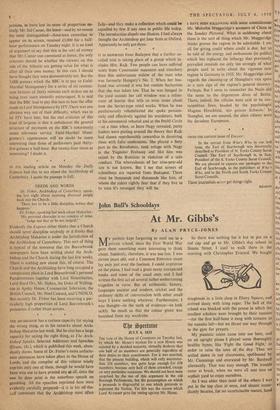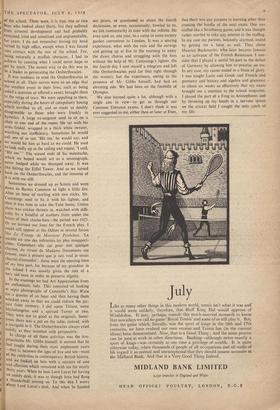John Bull's Schooldays
At Mr. Gibbs's
By ALAN PRYCE-JONES M1, parents kept forgetting to send me to a private school, since the First World War gave them something more interesting to think about. Suddenly, therefore, it was too late. I was eleven years old, and a Common Entrance exam lay only just over the horizon. I could improvise on the piano, I had read a great many unexpected books and none of the usual ones and I had written the first act of several rather embarrassing tragedies in verse. But of arithmetic, history, languages ancient and modern, cricket and the ordinary skills of conversation with other small boys I knew nothing whatever. Furthermore, I was thought—in- the teeth of evidence—to look sickly. So much so that the colour green was banished from my wardrobe. So there was nothing for it but to put on a red cap and go to Mr. Gtbbs's day school in Sloane Street. I used to walk there in the morning with Christopher Everard. We bought doughnuts in a little shop in Ebury Square, and arrived dusty with icing sugar. The hall of the school was blocked with the prams in which the smallest scholars were brought by their nannies —for the first half-hour it rang with screams as the nannies left—but we thrust our way through to the gym for prayers.
My pianistic talent came into use here, and on an upright piano I played some thoroughly pr healthy hymn, like 'Fight the Good Fight,' in ha order to raise the tone of the day. Then we settled down in our classrooms, spellbound by of Mr. Cummings and overawed by Mr. Bardwell ar alternately. That was easy enough. The trouble au came at break, when we were all sent into an th asphalt yard to enjoy ourselves. ar As I was older than most of the others I was put in the top class at once, and almost imme- at diately became, for no ascertainable reason, head of the school. There were, it is true, one or two boys who looked about thirty, but they suffered from arrested development and had probably remained, kind and unnoticed and unpromotable, for years. I do not remember having my head turned by high office, except when I was forced into contact with the rest of the school. For, being naturally a pnuffish character, I had to achieve by cunning what I could never hope to get by merit. The easiest way to do this was to be a leader in persecuting the Omberthwaites.
It was madness to send the Omberthwaites to school at all. Their nerves were so on edge that the smallest event in their lives, such as being asked a question or offered a sweet, brought them to, the verge of tears. We were appalling to them, especially during the hours of compulsory boxing which terrified us all, and so made us doubly disagreeable to those who were frankly in hysterics. A large ex-sergeant used to sit on a chair at one end of the room. He sat with his arms folded, wrapped in a thick white sweater, watching our inefficiency. Sometimes he would call one of us out. 'Hit me,' he would say, and We would hit him as hard as we could. He used to look sadly up at the ceiling and repeat, 'I said, "Hit me."' The waxed end § of his moustache, which we 'hoped would act as a seismograph, never budged while we thumped away. It was like hitting the Eiffel Tower. And so, we turned back on the Omberthwaites, and the remorse of it is with me still.
Sometimes we dressed up as Scouts and went down to Barnes Common to light a little fire. After an hour of twirling with two sticks, Mr. Cummings used to fix it with his lighter, and then it was time to take the .Tube home. Unless there was cricket thrown in, watched with diffi- culty by a handful of mothers from under the brims of their cloche-hats—the period was 1925. Or we learned our lines for the French play. I could still appear at the Odeon in several farces like Le Voyage de Monsieur Perrichon. 'La surdite est une des infirmites les plus insupport- ables. Cependant elle eut pour moi quelque charrne, du vivant de Madame Damoiseau ma femme, mais a present que je suis veuf je serais charm d'entendre' : those were the opening lines of my best part, for because of my grandeur in the school I was usually given the role of a very old man in order to preserve dignity. In the evenings we had Art Appreciation from an enthusiastic lady. This consisted of looking at sepia photographs of Constable's Hay Wain for a quarter of an hour and then having them Whisked away so that we could redraw the pic- ture from memory. I did some Titians, some Michelangelos and a spirited Turner or two. They were not so good as the originals. Some- times there was a pot on the table, instead, with a marigold in it. The Omberthwaites always cried noisily as they wrestled with perspective. In charge of all these activities was the irre- proachable Mr. Gibbs himself. It seemed that he had taught during their most unpleasant years —that is, between the ages of five and ten—most of the celebrities in contemporary British history, and we looked on him with a mixture of awe and affection which remained with me for nearly thirty years. When he beat Lord Lovat for having an untidy desk, it was as though Jove had flung a thunderbolt among us. To this day I worry about Lord Lovat's desk. And when he handed out prizes, or questioned us about the fourth declension, or even, occasionally, bowled to us, we felt momentarily in tune with the infinite. He even took us, one year, to a camp in some rectory garden convenient to London. It was a searing experience, what with the rain and the earwigs and getting up at five in the morning to enjoy the dawn chorus and struggling with the fires without the help of Mr. Cummings's lighter. On the fourth day I sent myself a telegram and left (the Omberthwaites paid for that right through the winter); but the experience, owing to the presence of Mr. Gibbs himself, had had an elevating side. We had been on the foothills of Olympus.
We also learned quite a lot, although with a single aim in view—to get us through our Common Entrance exams. I don't think it was ever suggested to me, either then or later at Eton, that there was any purpose in learning other than crossing the hurdle of the next exam. One was stuffed like a Strasbourg goose, and it was thought rather morbid to take any interest in the stuffing. In my case my parents, belatedly alarmed, ended by getting me a tutor as well. They chose Maurice Buckrnaster, who later became famous as an activator of the French Resistance. I con- sider that I played a useful bit-part in the defeat of Germany by allowing him to practise on me. In any case, my career ended in a blaze of glory. I was taught Latin and Greek and French .and geometry and history and algebra and grammar in about six weeks so effectively that my exam brought me a mention in the school magazine, I played the part of a Frog in Aristophanes and by throwing up my hands in a nervous spasm on the cricket field I caught the only catch of my life.























































 Previous page
Previous page